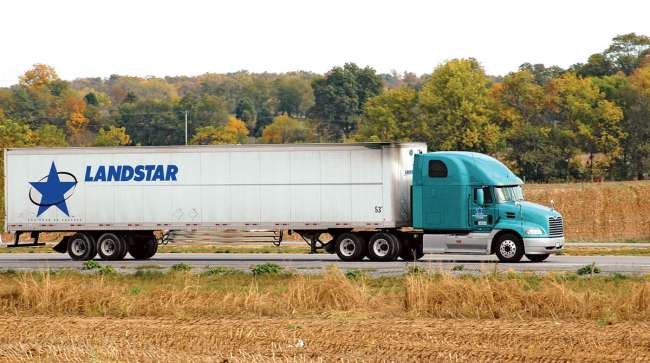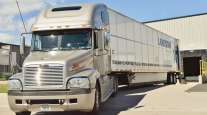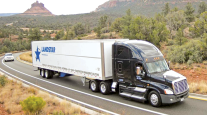Staff Reporter
Landstar Q2 Profits Dip Amid Dry Van Market Softness

[Stay on top of transportation news: Get TTNews in your inbox.]
Profit and revenue at Landstar System Inc. fell in the second quarter of 2024, largely on the back of truckload market weakness.
Revenue rose compared with the first three months of the year, the first sequential quarter-to-quarter revenue increase since Q2 2022, although Q2 is typically a stronger quarter for carriers than the first quarter.
Landstar posted a profit of $99.7 million, or $2.79, per diluted share, in the most recent quarter, down 31.1% from $144.8 million, $4.03, in the year-ago period.
Jacksonville, Fla.-based Landstar reported $1.225 billion in revenue in Q2, down 10.8% compared with $1.374 billion in the year-ago period.
Analysts expected better. Consensus analyst expectations for Q2 came in at $1.26 billion, according to Zacks Equity Research.
Jeff Loftus of FMCSA joins TT’s Seth Clevenger to discuss the current outlook on ADAS technology and how it will affect the industry at large. Tune in above or by going to RoadSigns.ttnews.com.
Landstar revenue from haulage carried out by independent business capacity owners (BCOs) and truck brokerage carriers in Q2 totaled $1.106 billion, or 90% of revenue, compared with $1.247 million, or 91% of revenue, in the year-ago period, it said July 30.
Revenue from dry van truckload operations in the most recent quarter fell 12% to $619 million from $703 million a year earlier.
The number of loads hauled via truck declined 8.9% in the most recent quarter to 998,670 from 1,121,660 in the second quarter of 2023, at the low end of the company’s guidance in its Q1 results.
Landstar expected the number of loads hauled via truck to be 5% to 9% lower year over year in Q2.
Truck revenue per load declined 2.6% to $2,178 in Q2 from $2,292 a year earlier, slightly below the midpoint of the company’s last guidance. The company expected revenue per truckload to be flat to 4% lower.
Dry van spot rates as July came to a close were 11% below the five-year-average and volume was 30% below the five-year-average, according to FTR Transportation Intelligence.

Lonegro
“In the 2024 second quarter, overall, demand in the freight environment was soft [because] the impact of accumulated inflation on goods continued to impact the amount of truckload freight generated in relation to consumer spending,” CEO Frank Lonegro said during the company’s quarterly earnings call.
“Industrial output was inconsistent throughout the quarter as evidenced by an [Institute for Supply Management Manufacturing PMI] that fluctuated just barely above and below 50. We remain in a loose truck capacity environment when measured by historical standards and market conditions favor the shipper,” Lonegro said during the July 30 call.
Landstar expects third-quarter truckload volumes will be 6% to 10% lower year on year, and truck revenue per load to be flat to up 4% compared with the year-ago period.
Truck revenue per load is outperforming pre-pandemic patterns so far in Q3, said Lonegro, adding: “So, I’m a little reluctant to lean in and say happy days are here again. But I do think that we’re seeing a little bit of lift on the revenue side.”
For things to improve, the company’s top executive said, continued GDP growth and a decrease in the amount of carrier capacity will be required, although uncertainty over November’s presidential election is tamping down optimism.
Landstar ranks No. 10 on the Transport Topics Top 100 list of the largest for-hire carriers in North America and No. 3 among truckload carriers.
Want more news? Listen to today's daily briefing below or go here for more info:





